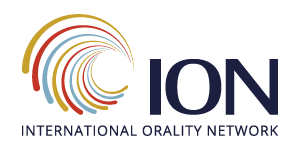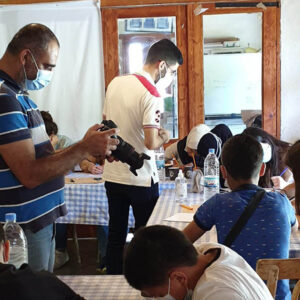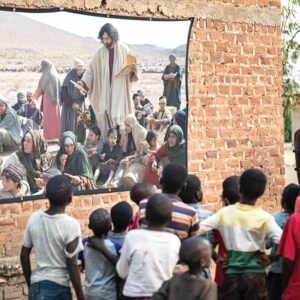Probably every people group in history has used stories to record important events, pass on their beliefs, teach correct behaviour or reflect their world view. Much of the Bible itself was transmitted orally for centuries before it was first written down.
An estimated two-thirds of the world learns better through stories, proverbs and songs than through the written word. Bible storying is therefore an ideal method for sharing the good news of Jesus. The ability to tell Bible stories clearly, accurately and naturally in their own language is a valuable tool for evangelism and discipleship.
Following storying models such as OneStory, storying teams help people to select sets of stories that will be relevant to their communities’ experience, address current challenges they are facing, and help them to understand the world through God’s eyes. For example, a set of stories for an animistic group might include stories that illustrate God’s power over spirits, such as stories describing Jesus casting out demons. Story sets are also designed to be told chronologically, in a series that works together to tell the big story of the Bible, from creation to new creation.

Suliana Mau leads a Bible storytelling workshop in the Kingdom of Tonga
Photographer: Elyse Patten
‘The story set should cover the basics of what a new believer should know from the Bible. We use the Apostles’ Creed for this.’
– from the OneStory website
Storying teams run workshops to help believers to craft and learn oral Bible stories in their own language. The believers are encouraged to tell the stories in small groups, and invite their friends and relatives to hear them. As the listeners give feedback, the teams and participants improve the stories together to make them more memorable and natural, so that accuracy is not lost through retelling. The stories are also recorded to make sure that the final checked version is preserved accurately, and the recordings can then be shared with the community through various forms of digital media.
Once the stories have been crafted, checked and approved, story fellowship groups begin. People tell and listen to the stories and then discuss them together: ‘What did you like about the story? What didn’t you like? What does the story tell us about humanity? What does it teach us about God? How can you apply this to your life?’

Godwin Kwaku operates an audio device for a weekly listening group in Jugboi in northern Ghana, playing the Scriptures in Deg.
Photographer: Rodney Ballard
People sometimes combine the stories with song, dance or drama. Teams encourage them to incorporate their cultural art forms when telling Bible stories.
‘With this method, I can understand the Bible easily. At church, every week they do a Bible class. But I can’t understand everything and after a while, I forget. But with the [oral] Bible stories, I can understand everything. I can tell them to my friends. I want to tell the stories more.’
– a lady from Southeast Asia
Storying often leads to a thirst for more Scripture, which can in turn lead to a desire to translate the rest of the Bible. Translation may begin even as people continue to tell stories. Thriving story fellowship groups serve as evidence that the many years of Bible translation ahead will be worthwhile, that people really want God’s word in their own language, just as the translation provides further material for new oral Bible stories.
Praise God for such a great variety of ways to share his word!
If you’re interested in communicating God’s word to an oral culture through Bible storying, why not attend this five-day course in January?
« Growing orality trends impact how we share the G...Why the Community Caste Focus is Needed »










